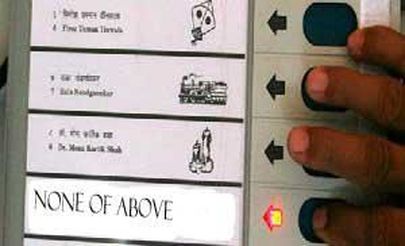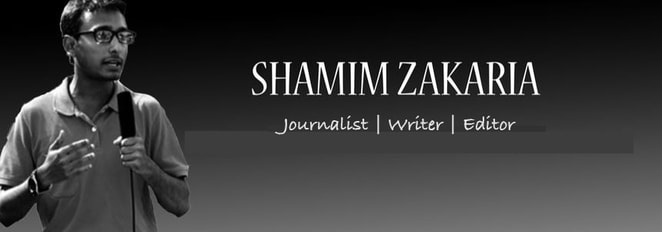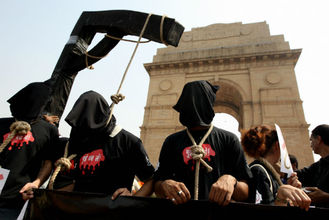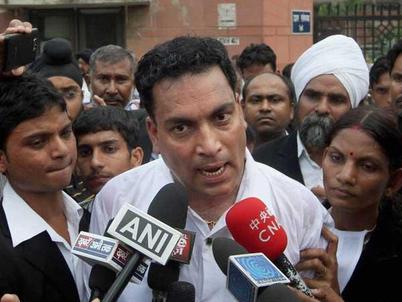 Image Courtesy- right-to-reject.blogspot.com
Image Courtesy- right-to-reject.blogspot.com I was in the midst of a seminar, when the cell phone suddenly vibrated to a SMS, as the session was an important as well as interesting one, so unwillingly I opened the message. The message sent by one of my friend from Guwahati, filled my eyes with glitter, anticipation and hopes, which to a large extent broke off my cynical views. The message said, “Supreme court gives historic judgments of right to reject. Victory for the common man!! Time to celebrate” Somehow impatiently I waited till the end of the seminar and after it got over the first thing I did was, confirmed the news.
It was not just me who was blithered; certainly 27th September, 2013 was a very overwhelming day for every voter of the country, especially the one concerned about the political sphere. And why not it be, after days of desperate wait finally the Hon’ble Supreme Court of India pronounced its landmark ruling directing the Election Commission to include a None of the Above Button (NOTA) in all the Electronic Voting Machines (EVM) and ballot papers. This signifies that, during elections if a voter can’t find any of the given candidates suitable, he/she can press the NOTA button and reject all the candidates. This historic judgment was accepted whole heartedly by every section of the common Indians which eventually resulted in celebrations across the country in bits and pieces, snippets of which was seen in Guwahati’s Digahalipukhuri area too.
One can’t deny the fact that India’s political scenario is certainly worsening with every passing day and something unprecedented was perhaps the call of the hour and keeping pace with it, this judgment can be considered as an initial step towards immaculate politics. And with this India has become the thirteenth nation with an option of negative voting.
When the aura of the atmosphere is of elections, we often come across people deciding to refrain from casting their votes. The most common reason cited is the lack of good people in the political arena and most importantly the absence of any suitable candidate. As a result the voters hold themselves back from exercising the most important right in a democracy i.e. the right to vote. However with this new rule being implemented, there might possibly be change in the mindset of people which in turn may increase the voters turn out. Further it might also compel the political parties to put forward untainted and appropriate candidates meeting with the demands of the voters, which would eventually lead to a systemic change in electoral process.
However amidst all celebrations, one side of the coin has not yet grabbed public attention, making the rule a tossed-up one. A thorough analysis of the judgment reveals that, the NOTA option won’t impact the results of the election even if 50% of the voters opt for NOTA. For instance, even if 90 voters in an electorate of 100 persons press the NOTA button, the poll will be decided in favor of the candidate who gets the maximum of the remaining 10 votes. There’s no provision for re-election. As a result of this the candidate whom people presumed to be unfit might come to power.
Nevertheless, keeping aside the flaws this new rule can be considered a drop in the bucket of India’s changing political scenario. As it’s said, “Democracy is for the people, of the people and by the people” and with this historic ruling by the apex court India’s staking democracy would be safeguarded to great extent. The NOTA option certainly marks the beginning of a political revolution and as common citizens, we can behold a new dawn in India's political scenario with hopes that it will be devoid of any filth, which as of now had compelled the common man to sheerly loathe politics.
Though it’s too early to make bountiful expectations, however as 2014 Lok Sabha polls is knocking at the door, we might very well see its repercussions.
No unauthorized publication or use of any content allowed without prior permission | All rights reserved by the author | Feel free to Share via buttons displayed on the left side
It was not just me who was blithered; certainly 27th September, 2013 was a very overwhelming day for every voter of the country, especially the one concerned about the political sphere. And why not it be, after days of desperate wait finally the Hon’ble Supreme Court of India pronounced its landmark ruling directing the Election Commission to include a None of the Above Button (NOTA) in all the Electronic Voting Machines (EVM) and ballot papers. This signifies that, during elections if a voter can’t find any of the given candidates suitable, he/she can press the NOTA button and reject all the candidates. This historic judgment was accepted whole heartedly by every section of the common Indians which eventually resulted in celebrations across the country in bits and pieces, snippets of which was seen in Guwahati’s Digahalipukhuri area too.
One can’t deny the fact that India’s political scenario is certainly worsening with every passing day and something unprecedented was perhaps the call of the hour and keeping pace with it, this judgment can be considered as an initial step towards immaculate politics. And with this India has become the thirteenth nation with an option of negative voting.
When the aura of the atmosphere is of elections, we often come across people deciding to refrain from casting their votes. The most common reason cited is the lack of good people in the political arena and most importantly the absence of any suitable candidate. As a result the voters hold themselves back from exercising the most important right in a democracy i.e. the right to vote. However with this new rule being implemented, there might possibly be change in the mindset of people which in turn may increase the voters turn out. Further it might also compel the political parties to put forward untainted and appropriate candidates meeting with the demands of the voters, which would eventually lead to a systemic change in electoral process.
However amidst all celebrations, one side of the coin has not yet grabbed public attention, making the rule a tossed-up one. A thorough analysis of the judgment reveals that, the NOTA option won’t impact the results of the election even if 50% of the voters opt for NOTA. For instance, even if 90 voters in an electorate of 100 persons press the NOTA button, the poll will be decided in favor of the candidate who gets the maximum of the remaining 10 votes. There’s no provision for re-election. As a result of this the candidate whom people presumed to be unfit might come to power.
Nevertheless, keeping aside the flaws this new rule can be considered a drop in the bucket of India’s changing political scenario. As it’s said, “Democracy is for the people, of the people and by the people” and with this historic ruling by the apex court India’s staking democracy would be safeguarded to great extent. The NOTA option certainly marks the beginning of a political revolution and as common citizens, we can behold a new dawn in India's political scenario with hopes that it will be devoid of any filth, which as of now had compelled the common man to sheerly loathe politics.
Though it’s too early to make bountiful expectations, however as 2014 Lok Sabha polls is knocking at the door, we might very well see its repercussions.
No unauthorized publication or use of any content allowed without prior permission | All rights reserved by the author | Feel free to Share via buttons displayed on the left side

This work is licensed under a Creative Commons Attribution-NonCommercial-NoDerivs 3.0 Unported License.




